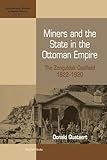Miners and the State in the Ottoman Empire : The Zonguldak Coalfield, 1822-1920 / Donald Quataert.
Material type: TextSeries: International Studies in Social History ; 7Publisher: New York ; Oxford : Berghahn Books, [2006]Copyright date: ©2006Description: 1 online resource (288 p.)Content type:
TextSeries: International Studies in Social History ; 7Publisher: New York ; Oxford : Berghahn Books, [2006]Copyright date: ©2006Description: 1 online resource (288 p.)Content type: - 9781845451349
- 9781782387220
- Coal mine accidents -- Turkey -- Zonguldak İli -- History
- Coal mine accidents -- Turkey -- Zonguldak İli -- History
- Coal miners -- Turkey -- Zonguldak İli -- History
- Coal miners -- Turkey -- Zonguldak İli -- History
- Coal mines and mining -- Turkey -- Zonguldak İli -- History
- Coal mines and mining -- Turkey -- Zonguldak İli -- History
- HISTORY / Modern / 19th Century
- History (General), History: 18th/19th Century, History: 20th Century to Present, Sociology
- 331.7/62233409563 22
- HD8039.M62 T96 2006
- online - DeGruyter
| Item type | Current library | Call number | URL | Status | Notes | Barcode | |
|---|---|---|---|---|---|---|---|
 eBook
eBook
|
Biblioteca "Angelicum" Pont. Univ. S.Tommaso d'Aquino Nuvola online | online - DeGruyter (Browse shelf(Opens below)) | Online access | Not for loan (Accesso limitato) | Accesso per gli utenti autorizzati / Access for authorized users | (dgr)9781782387220 |
Frontmatter -- Contents -- Illustrations -- Acknowledgments -- 1 Introduction and Historiographical Essay -- 2 The Ottoman Coal Coast -- 3 Coal Miners at Work: Jobs, Recruitment, and Wages -- 4 “Like Slaves in Colonial Countries” Working Conditions in the Coalfield -- 5 Ties That Bind Village-Mine Relations -- 6 Military Duty and Mine Work: The Blurred Vocations of Ottoman Soldier-Workers -- 7 Methane, Rockfalls, and Other Disasters: Accidents at the Mines -- 8 Victims and Agents: Confronting Death and Safety in the Mines -- 9 Wartime in the Coalfield -- 10 Conclusion -- Appendix on the Reporting of Accidents -- An Ottoman Miner’s Glossary -- Notes on Calendar System -- Bibliography -- Index
restricted access online access with authorization star
http://purl.org/coar/access_right/c_16ec
The story of the miners of Zonguldak presents a particularly graphic local lens through which to examine questions that have been of major concern to historians—most prominently, the development of the state, the emergence of capitalism, and the role of the working classes in these large processes. This book examines such major issues through the actual experiences of coal miners in the Ottoman Empire. The encounters of mine workers with state mining officials and private mine operators do not follow the expected patterns of labor-state-capital relations as predicted by the major explanatory paradigms of modernization or dependency. Indeed, as the author clearly shows, few of the outcomes are as predicted. The fate of these miners has much to offer both Ottoman and Middle East specialists as well as scholars of the developing world and, more generally, those interested in the connections between economic development and social and political change.
Mode of access: Internet via World Wide Web.
In English.
Description based on online resource; title from PDF title page (publisher's Web site, viewed 25. Jun 2024)


